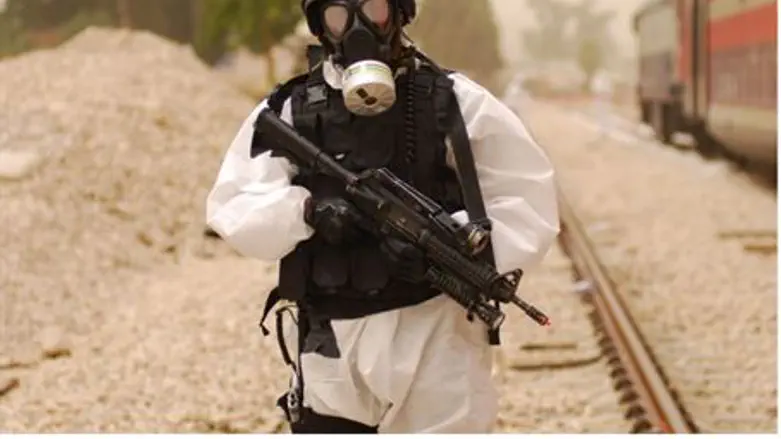
As Washington and Moscow discuss a Russian plan to rid Syria of chemical weapons, an Israeli official said Thursday that the threat of chemical attacks against Israel by terrorist groups "is neither theoretical nor distant."
Foreign Ministry spokesman Yigal Palmor also voiced his pessimism over a Russian initiative through which Syria's Assad regime could comply with chemical weapons treaties as a way of avoiding western military intervention.
Palmor said that the existing 20-year-old Chemical Weapons Convention, which has been proposed as the tool for verifying Syrian compliance, has failed to attract the multilateral support that would allow it to work, adding that Israel signed in 1993 but has never ratified it.
"Unfortunately, while Israel signed the Convention, other countries in the Middle East, including those that have used chemical weapons recently or in the past, or are believed to be working to improve their chemical capabilities, have failed to follow suit and have indicated that their position would remain unchanged even if Israel ratifies the Convention," Palmor said.
"Some of these states don't recognise Israel's right to exist and blatantly call to annihilate it," he continued.
"The chemical weapons threat against Israel and its civilian population is neither theoretical nor distant," he told Israeli daily Haaretz.
Palmor explained that the primary chemical weapons threat to Israel comes from non-state actors, as opposed to the Syrian government itself.
"Terror organisations, acting as proxies for certain regional states, similarly pose a chemical weapons threat. These threats cannot be ignored by Israel, in the assessment of possible ratification of the Convention."
It is worth noting that the Assad regime has a number of options in this regard, including a strategic alliance with Hezbollah, an Iranian-sponsored terrorist group based in Lebanon, which has in the past launched rocket attacks and other assaults on Israel and has actively supported pro-government forces on the battlefield during the ongoing Syrian civil war.
The Syrian government also maintains effective control over a number of fringe, far-left Palestinian Arab factions, most notably the Popular Front for the Liberation of Palestine-General Command (PFLP-GC), which in recent decades was effectively subsumed into the Syrian state apparatus.
Syria, one of five countries not to have signed the global treaty, said on Tuesday it had accepted the Russian proposal, as France kept up the pressure with a draft UN resolution threatening force if the regime failed to comply.
Syrian President Bashar al-Assad's regime is accused of using chemical arms in an August 21 attack that killed hundreds of people on the outskirts of Damascus.
The convention initially aimed to eliminate all chemical weapons by 2007.
Israel and Myanmar have signed the convention but not ratified it, while Angola, Egypt, North Korea, South Sudan and Syria have done neither.
Israel's northern neighbour Lebanon has ratified, as has its arch-foe Iran.
The CWC has four main provisions, the destruction of all chemical weapons under strict verification, monitoring of the chemical industry to prevent arms development, helping protect nations against chemical threats and boosting global cooperation to strengthen implementation.